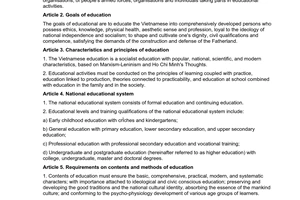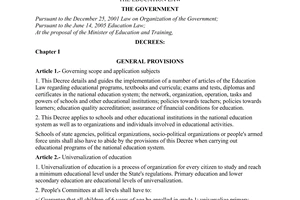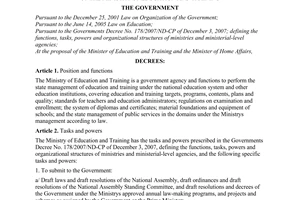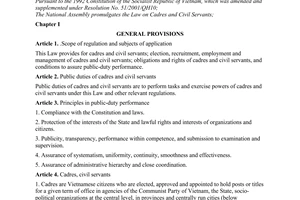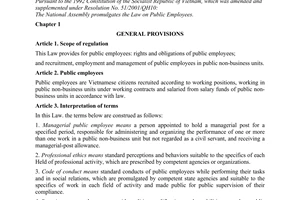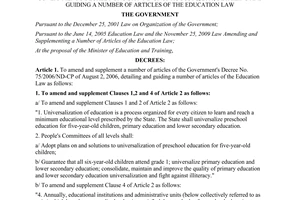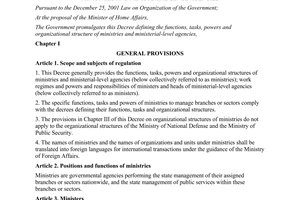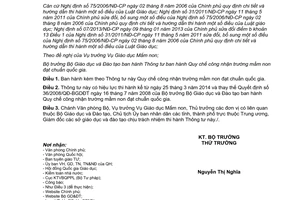Circular 02/2014/TT-BGDĐT statutes national accreditation preschools đã được thay thế bởi Circular 19/2018/TT-BGDDT preschool accreditation and recognition of national standard preschools và được áp dụng kể từ ngày 10/10/2018.
Nội dung toàn văn Circular 02/2014/TT-BGDĐT statutes national accreditation preschools
|
MINISTRY OF
EDUCATION AND TRAINING |
SOCIALIST
REPUBLIC OF VIETNAM |
|
No.: 02/2014/TT-BGDĐT |
Hanoi, February 08, 2014 |
CIRCULAR
PROMULGATING STATUTES OF NATIONAL ACCREDITATION OF PRESCHOOLS
Pursuant to the Law on Education dated June 14, 2005; the Law dated November 25, 2009 on amendments to the Law on education;
Pursuant to the Government’s Decree No. 36/2012/ND-CP dated April 18, 2012 defining the functions, tasks, power and organizational structure of Ministries and Ministerial-level agencies;
Pursuant to the Government’s Decree No. 32/2008/ND-CP dated March 19, 2008 defining the functions, tasks, power and organizational structure of Ministry of Education and Training;
Pursuant to the Government’s Decree No. 75/2006/ND-CP dated August 02, 2006 detailing and guiding the implementation of certain articles of the Law on education; the Government’s Decree No. 31/2011/ND-CP dated May 11, 2011 on amendments to the Government’s Decree No. 75/2006/ND-CP dated August 02, 2006 detailing and guiding the implementation of certain articles of the Law on education; the Government’s Decree No. 07/2013/ND-CP dated January 09, 2013 on amending Point b Clause 13 Article 1 of the Government’s Decree No. 31/2011/ND-CP dated May 11, 2011 on amendments to the Government’s Decree No. 75/2006/ND-CP dated August 02, 2006 detailing and guiding the implementation of certain articles of the Law on education;
At the request of the Director General of Department of Pre-school Education;
Minister of Education and Training promulgates a Circular on promulgation of the statutes of national accreditation of preschools.
Article 1. The Statutes of national accreditation of preschools are attached to this Circular.
Article 2. This Circular takes effect as of March 25, 2014 and replaces the Decision No. 36/2008/QĐ-BGDĐT dated July 16, 2008 by Minister of Education and Training providing for the statutes of national accreditation of preschools.
Article 3. Office Chief of the Ministry, Director General of the Department of Pre-school Education, Heads of relevant units affiliated to Ministry of Education and Training, Presidents of People’s Committees of central-affiliated cities or provinces, and Directors of Departments of education and training shall be responsible for implementing this Circular./.
|
|
PP MINISTER |
STATUTES
OF NATIONAL ACCREDITATION OF PRESCHOOLS
(Enclosed to the Circular No. 02 /2014/QĐ-BGDĐT dated February 08, 2014 by
Minister of Education and Training)
Chapter I
GENERAL PROVISIONS
Article 1. Scope and regulated entities
1. These Statutes provide for the national accreditation of preschools, consisting of: standards, documents, and procedures for national accreditation of preschools.
2. These Statutes shall apply to preschools, nursery schools and kindergartens (hereinafter referred to as preschools) which are established under forms of the national education system, and relevant entities.
Article 2. Levels of accreditation
Preschools that meet national standards may be accredited at level 1 or level 2.
1. Level 1: A preschool that is accredited at this level must meet all necessary standards of a national qualified school to organize comprehensive and qualified child caring and educational activities in conformity with objectives of preschool education.
2. Level 2: A preschool that is accredited at this level must meet all necessary standards of a national qualified school to organize comprehensive and qualified child caring and educational activities at a level higher than level 1 and approach development level of preschools in advanced countries in the region and in the world.
Article 3. Conditions for national accreditation
In order to apply for national accreditation, a preschool must achieve the title “Trường tiên tiến” ("Preschool having outstanding performance") in the previous academic year and meet all standards mentioned in Chapter II of these Statutes.
Article 4. Period of national accreditation
Decision on national accreditation of a preschool shall be valid within 5 years from the date on which it is signed. Within the period of 05 years, if the national qualified school fails to meet any of the standards mentioned in these Statutes, the issued Decision and National Certificate of Qualified Preschool shall be revoked.
After 05 years from the date on which decision on national accreditation of preschool is granted, the preschool that has been accredited must carry out the self-assessment, and submit application to a competent accrediting body for inspection and re-accreditation. Procedures for re-accreditation are similar to those for initial accreditation.
Article 5. Power to make accreditation
Presidents of People’s Committees of central-affiliated cities or provinces (hereinafter referred to as Presidents of Provincial People’s Committees) shall make decision and award national certificate of qualified preschool. The said national certificate of qualified preschool shall use the form mentioned in Annex I of this Circular.
Chapter II
NATIONAL ACCREDITATION STANDARDS FOR PRESCHOOLS
Section 1. LEVEL-1 NATIONAL ACCREDITATION STANDARDS FOR PRESCHOOLS
Article 6. Organization and management
1. Management
a) The preschool must have prepare operating plans for each academic year, each semester, each month and each week; adopt measures for implementing such plans on schedule;
b) The preschool's Principal, Deputy Principals, and heads of specialized panels must manage and assign tasks to officials, teachers and employees in an appropriate manner in conformity with regulations in the Preschool Charter, the Law on officials and the law on public employees;
c) Organize and manage administrative and financial affairs, and regulations on professional activities, democracy, and internal inspection in a good way to promote managerial tasks, working relationship and manner of the preschool;
d) Effectively manage and use facilities to serve the child care and education activities; maintain beautiful and safe environment;
dd) Retain documents serving the preschool’s management affairs in a sufficient and scientific manner;
e) Implement all policies applicable to employees as regulated by prevailing laws;
g) Regularly organize and maintain emulation movements in conformity with guideline by specialized education and training bodies and state regulations;
h) Adopt measures for improving life of the preschool’s officials, teachers and employees.
2. Organization
a) Principal and Deputy Principals must have at least 5 years and 3 years, respectively, of managerial experience in preschool education; possess 3-year associate degree in Early Childhood Education or higher; have graduated from training courses in educational management and political theory as regulated; have applied information technology applications to management of professional activities. Annually, the Principal must be ranked from “Khá” (“Good”) level or higher by competent educational supervisory body in conformity with professional standards for preschool principals promulgated by Ministry of Education and Training; the preschool must ensure mandatory number of Deputy Principals as regulated.
b) Preschool Principal and Deputy Principals must have qualified capability for managing and organizing its activities, have a thorough grasp of the Early Childhood Education program; have good virtuous character and have confidence of all teachers, officials and employees in school as well as local residents. Annually, they must won the title “Lao động tiên tiến” (“Outstanding employee”) or higher.
3. Preschool’s organizations, unions and councils
a) The School Council and the Management Council, for respectively a public preschool and people’s founded or private preschool, and other councils in the preschool must be established and operate in conformity with regulations in the Preschool Charter; attach special attachment to the supervision of preschool’s activities, and supervision of the implementation of resolutions and democracy regulations in its activities;
b) Party’s executive committee, Trade Union, and the Communist Youth Union in the preschool must carry out relevant activities in effective manner for the purpose of enhancing the development of preschool and improving quality of child care and education activities;
c) The parent representation committee must closely coordinate with the preschool in child care and education activities, and mobilization of contributions from the community to local preschool education movements.
4. Implementation of the Party’s guideline, the government's laws and instructions by educational supervisory bodies at all levels
a) The preschool must implement the Party’s guideline and the Government's law on preschool education; operate under the management of local government; actively offer advice to the Party’s executive committee, and local government on development plans and practical measures for fulfilling objectives in preschool education;
b) The preschool must comply with direct instructions on professional skills and practices by Division of Education and Training, and comply with regulations on reporting to superior supervisory agencies.
Article 7. Personnel
1. Quantity and educational qualification
Have sufficient quantity of teachers and employees as regulated. 100% of teachers and employees meet educational qualification standards, among which, at least 40% of teachers possess qualifications above regulated level of educational qualification standards.
2. Character, moral standards and professional capacity
a) At least 50% of teachers have won the title “Giáo viên dạy giỏi cấp trường” (“Outstanding teacher at school level”), among which, at least 20% of teachers are awarded the title “Giáo viên dạy giỏi cấp huyện” (“outstanding teacher at district level”) or higher;
b) Annually, at least 70% of teachers and employees have won the title “Lao động tiên tiến” (“Outstanding employee”), and the preschool must have teachers or employees winning the title “Chiến sĩ thi đua cấp cơ sở” (“Grassroots-level emulation fighter”) or higher. None of school's officials, teachers and employees is disciplined at warning level or higher. None of teachers has poor professional performance;
c) Annually, at least 50% of teachers are ranked at “Khá” (“Good”) level or higher in conformity with professional standards for preschool teachers promulgated by Ministry of Education and Training, among which, at least 50% of teachers are ranked at “Xuất sắc” (“Excellent”) level, and there is no teacher ranked at “Kém” (“Poor”) level.
3. Professional activities
a) Specialized panels' activities are conformable with the Preschool Charter;
b) The following activities must be regularly carried out: exchange of professional skills, seminar-based activities, fieldtrips for learning experience, and reports must be prepared for each corresponding activity;
c) Teachers must sufficiently participate in professional activities, seminar-based activities and social activities organized by the preschool itself or in cooperation with other entities;
d) Teachers are able to apply information technology to child care and education activities.
4. Training plans
a) Have personnel development planning and training plans for teachers for the purpose of increasing the number of teachers whose qualifications are above regulated level of educational qualification standards of preschool teachers;
b) Organize regular training programs, summer training programs and seminar-based training programs as regulated by Ministry of Education and Training;
c) 100% of teachers prepare and implement plans for self-improvement of professional skills and practices.
Article 8. Quality of child care and education
The preschool’s results of the implementation of tasks in an academic year and Early Childhood Education program adopted by the Ministry of Education and Training must meet the following requirements:
1. 100% of preschool education groups or classes provide meals to semi-boarding children.
2. 100% of children are protected physically and mentally. There is no case of epidemic diseases or food poisoning occurred in the preschool.
3. 100% of children have regular health examination as regulated in the Preschool Charter.
4. Children’s attendance rate: 90% or higher for children aged 5, and 85% or higher for children of other age groups.
5. At least 85% of children grow normally in terms of age-based weight and height.
6. 100% of malnourished children are intervened by appropriate measures for reducing malnourishment status.
7. At least 95% of children aged 5 successfully complete the Early Childhood Education program. 100% of children aged 5 are assessed according to the Child growth standards for children aged 5. 100% of children under 5 years of age took 2 classes/day.
8. At least 80% of children with disabilities have made progress during the inclusive education (if any).
Article 9. Scale of preschool, class, facilities and equipment
1. Scale of the preschool, preschool education groups or classes
The number of children and the number of preschool education groups or classes in a preschool must comply with regulations in the Preschool Charter; all preschool education groups or classes are arranged according to children’s groups of age.
2. School’s features: the preschool’s location is in the centre of a residential area which is convenient for children to go to school. Regulations on environmental hygiene and safety are strictly implemented.
3. Requirements on design and construction: the preschool’s usable area must ensure minimum usable space per each child as regulated in the Preschool Charter. The preschool has permanent or semi-permanent work items. The preschool must be surrounded by brick, wooden, or metal walls, or fenced by trimmed trees to separate its precinct from the outside. At the main gate of the preschool, a name sign thereof must be placed as regulated in the Preschool Charter. The clean water resource and drainage system must be available in the preschool.
4. Specialized departments
a) Block of rooms for preschool education groups or classes:
- Social hall: average space for each child must be ensured as regulated in the Preschool Charter. This room must be equipped with correct furniture such as tables, chairs, tools, toys, and educational materials for children. Additionally, this room must be designed and decorated with suitable and beautiful pictures, flowers or ornamental plants. Specifications of facilities and equipment must comply with regulations by Ministry of Education and Training;
- Rest and nap room: average area for each child must be ensured as regulated in the Preschool Charter. The bedroom must be equipped with sufficient tools to help children sleep better;
- Restroom: average area for each child and other conditions must be satisfied as regulated in the Preschool Charter. The restroom location must be convenient for children to use, may be built near preschool education groups or classes. 01 toilet is available for 10 kids. Toilets shall be separated by partitions with a height of 1.2 meters. At least 01 children’s potty is available for 04 kids under 24 months of age. The toilet lavabo must have water taps with clean water and hand soaps for children. Toilet facilities are made of porcelain, and their sizes must be suitable to children;
- Playground area (this area may also be used for providing lunches to children) must be convenient for children’s activities whether it is sunny or rainy. The playground area must be designed and have average area for each child in conformity with standards mentioned in the Preschool Charter. The space between vertical railings of the handrail in the playground area shall not exceed 0.1 meter.
b) Block of rooms for learning purposes:
- Physical education and fine arts rooms: minimum area is 60 m2 per each room. These rooms must be equipped with facilities and tools suitable to children's activities in physical education and fine arts (musical toys, dance props, clothes, easels, hoops, etc.).
c) Block of table rooms:
- Average area for each child in the cooking area must be ensured as regulated in the Preschool Charter. It must be operated by employing one-way line as follows: food materials preparation area, processing area, cooking area and meal portioning area. Cooking furniture must be sufficient, clean and arranged orderly;
- Warehousing area must be divided in a scientific way for storing each type of foods and in conformity with regulations on foods hygiene and safety;
- Fridge must be available for storing food samples.
d) Block of administrative rooms:
- School office: minimum area is 30 m2, equipped with meeting table, office filing cabinet and boards as regulated by Ministry of Education and Training;
- Principal’s room: minimum area is 15 m2, equipped with necessary equipment for working and a desk for receiving guests;
- Deputy Principal’s room: area and furniture are similar to those of the principal’s room;
- Administrative office: minimum area is 15 m2, equipped with computers and working equipment;
- Medical room: minimum area is 12 m2, equipped with medical instruments and devices for following children's health. The notice board for posting measures for medical treatment and caring malnourished children and overweight children; plan for immunization schedule and health examination for children; images and pictures for propagating measures for childcare and prevention of diseases must be available;
- Guard room/watch officer’s room: minimum area is 6 m2, equipped with tables, chairs, wall clock, board and customer records;
- Room for preschool’s staff: minimum area is 16 m2, equipped with cabinets for personal belongings;
- Restroom area for preschool’s teachers, managers and employees: minimum area is 9 m2, equipped with hand sinks and bathroom with sufficient water source;
- Parking area for preschool’s staff must ensure safety and convenience.
5. Garden: The playground must be designed and set up in a suitable manner. Trees in the playground must be regularly looked after in order to keep school yard more beautiful and cooler. Children are provided with opportunity for study and discovery by planting and looking after trees in the tree-planted playground. The children’s play area must be tiled (or cemented) and covered by grass carpet. At least 5 types of outdoor equipment and toys, which are in the list of outdoor equipment and toys for preschool education promulgated by Ministry of Education and Training, are available. The garden must be clean and have pool fence (if any).
Article 10. Private sector involvement in education
1. The preschool must fulfill the counseling role for the Party’s executive committee, local government, grassroots educational council and regulatory bodies about policies and measures for mobilizing resources for local preschool education development.
2. Activities in preschool
a) The preschool must carry out propagating activities in various forms for disseminating knowledge of the community and people about preschool education objectives, facilitating the community in participating in and supervising preschool’s child care and education activities for the purpose of fulfilling objectives and plans for preschool education;
b) The preschool must cooperate with children’s families in child care and education, and facilitate children in playing and studying; maintain the regular connection between the preschool, its teachers and families via parent-teach conferences, direct talk or other forms to help children grow in the best way;
c) The preschool takes charge and coordinate with relevant forces in the community and families to organize celebration and ceremony-related activities as regulated in the Early Childhood Education program in conformity with local traditions.
3. The preschool can mobilize the voluntary contributions of families, the community, enterprises and relevant entities for improving preschool facilities and organizing educational activities.
Section 2. LEVEL-2 NATIONAL ACCREDITATION STANDARDS FOR PRESCHOOLS
Article 11. Organization and management
The preschool satisfies standards mentioned in Article 6 of these Statutes. Particularly, the preschool principal and deputy principals must possess bachelor's degrees in Early Childhood Education or higher.
Article 12. Personnel
The preschool satisfies standards mentioned in Article 7 of these Statutes and the following requirements:
1. Quantity and educational qualification standards of teachers
Have sufficient quantity of teachers as regulated. At least 50% of teachers possess qualifications above regulated level of educational qualification standards of teacher.
2. Character, moral standards and professional capacity
a) At least 60% of teachers have won the title “Giáo viên dạy giỏi cấp trường” (“Outstanding teacher at school level”), among which, at least 30% of teachers have won the title “Giáo viên dạy giỏi cấp huyện” (“outstanding teacher at district level”) or higher;
b) Annually, at least 80% of teachers and employees have won the title “Lao động tiên tiến” (“Outstanding employee”);
c) Annually, at least 70% of teachers are ranked at “Khá” (“Good”) level or higher, among which, at least 50% of teachers are ranked at “Xuất sắc” (“Excellent”) level, in conformity with professional standards for preschool teachers promulgated by Ministry of Education and Training;
d) Each teacher must make plan for striving for mastery upon the completion of the assessment and ranking of teacher in conformity with regulations on standards of preschool teacher. Such plan must be included in teacher’s personal profiles.
3. Professional activities
a) Each teacher must make report on new solutions to child care and education in each academic year;
b) Teachers must make separate plan, and improve knowledge and skills for caring and educating malnourished children, autistic children and children with disabilities (if any).
Article 13. Quality of child care and education
The preschool satisfies standards mentioned in Article 8 of these Statutes and the following requirements:
1. Children’s attendance rate: 95% or higher for children aged 5, and 90% or higher for children of other age groups.
2. 100% of semi-boarding children are provided with meals in the preschool.
3. At least 95% of children grow normally in terms of age-based weight and height.
Article 14. Scale of school, class, facilities and equipment
The preschool satisfies standards mentioned in Article 9 of these Statutes and the following requirements:
1. The commune/ward, where the preschool’s head office is located, has satisfied standards of preschool educational universalization for children aged 5.
2. Computer room: minimum area is 40 m2, equipped with appropriate information technology equipment to serve children’s play and educational activities.
3. Preschool hall: minimum area is 70 m2. The preschool hall is a place to organize celebration and ceremony-related activities and may be used to exhibit preschool’s traditional objects, souvenirs, pictures, hand-made things and toys, etc.
4. There are at least 10 types of outdoor equipment and toys, which are in the list of outdoor equipment and toys for preschool education promulgated by Ministry of Education and Training, in the garden. The place for playing road safety games and children’s outdoor stage are also available.
Article 15. Private sector involvement in education
The preschool satisfies standards mentioned in Article 10 of these Statutes and may find sponsorships for its personnel to attend domestic and foreign training courses.
Chapter III
APPLICATION AND PROCEDURES FOR NATIONAL CERTIFICATION OF QUALIFIED PRESCHOOL
Article 16. Application for national certification of qualified preschool
The application for national certification of qualified preschool consists of:
1. The application which is submitted to People’s Committee of district or provincial-affiliated city (hereinafter referred to as District-level People’s Committee) consists of:
a) The report on self-assessment by the preschool, which is made according to each national accreditation standard for a preschool at level 1 or level 2 as regulated in this Circular, and certified by People’s Committee of commune, ward or town (hereinafter referred to as Commune-level People’s Committee);
b) Written proposal made by President of Commune-level People’s Committee, requesting the District-level People’s Committee to carry out the inspection and assessment.
2. The application which is submitted to a Provincial People’s Committee consists of:
a) The report on self-assessment by the preschool, which is made according to each national accreditation standard for a preschool at level 1 or level 2 as regulated in this Circular, and certified by Commune-level People’s Committee;
b) Report on assessment results by district-level inspection team (Annex II);
c) Written proposal made by District-level People’s Committee, requesting provincial People’s Committee to carry out the inspection and accreditation.
Article 17. Procedures for inspection and accreditation
Procedures for national accreditation of a preschool at level 1 and level 2 are as below:
1. The preschool and Commune-level People’s Committee shall, on the basis of regulations on national accreditation standards for preschools, carry out the self-assessment of satisfaction level of each standard by the preschool. The Commune-level People’s Committee shall submit written proposal to District-level People’s Committee to carry out the inspection of preschool at corresponding satisfaction level of standards.
2. Within 15 (fifteen) working days from the date on which the valid application is received, the District-level People’s Committee shall establish the inspection team and complete the verification at the request of the Commune-level People’s Committee. If the application is insufficient or invalid, the District-level People’s Committee shall return it or send written request to the Commune-level People’s Committee to supplement relevant documents.
District-level inspection team (including representatives of relevant specialized agencies who are appointed by president of the District-level People’s Committee) shall carry out the verification of assessment results of preschool by the Commune-level People’s Committee. The inspection team shall, on the verification results, send report to the District-level People’s Committee on the satisfaction level of national accreditation standards by the preschool. Then, the District-level People’s Committee shall send a written proposal to the Provincial People’s Committee for carrying out a verification of preschool’s satisfaction of national standards at such level.
3. Within 15 (fifteen) working days from the date on which the valid application is received, the Provincial People’s Committee shall establish the inspection team and complete the verification at the request of the District-level People’s Committee. If the application is insufficient or invalid, the Provincial People’s Committee shall return it or send written request to the District-level People’s Committee to supplement relevant documents.
The provincial-level inspection team (including representatives of relevant specialized agencies who are appointed by the president of the Provincial People’s Committee) shall carry out the verification of assessment results of preschool by the District-level People’s Committee. The inspection team shall, on the verification results, come to the conclusion on the satisfaction level by the preschool, and send written proposal to the president of the Provincial People’s Committee to make Decision and award National Certificate of Qualified Preschool at such level.
4. Within 10 (ten) working days from the date on which the written proposal made by the provincial-level inspection team is received, the president of the Provincial People’s Committee shall make Decision and award National Certificate of Qualified Preschool (Level 1 or Level 2) to the certified preschool.
Article 18. Contents of inspection
1. The preschool shall report on its striving process and its achievements according to level-1 or level-2 national accreditation standards for preschools.
2. Standard-based inspection
a) Inspect preschool’s documents/records: the preschool’s plan for an academic year, teaching plans made by teachers, records of children, records of preschool’s assets and other relevant documents/records at the request of the inspection team;
b) Carry out the classroom observation to assess the quality of child care and education activities, indoor and outdoor educational activities organized by teachers, and the participation in such activities by children;
c) Inspect the preschool’s facilities and equipment;
d) Take ideas of organizations and individuals inside and outside the preschool about child care and education activities, and other issues, where necessary.
3. Make records of inspection results according to each content of the national accreditation standards and come to final conclusion on the preschool's satisfaction of national standards.
Chapter IV
IMPLEMENTATION
Article 19. Responsibilities of preschool
The school’s board of rectors shall offer advice to the Party’s executive committee and local government to prepare plans for preschool construction and development for meeting national standards; maintain and promote certified achievements after obtaining national certificate of qualified preschool.
Article 20. Responsibilities of divisions of education and training, and departments of education and training
1. Offer advice to People’s Committees at all levels to prepare plans for construction and investment in local preschools for meeting national standards.
2. Expedite preschools to take actions for meeting national standards, and inspect preschools awarded national certificate of qualified school in maintaining certified standards.
3. Offer advice to People’s Committees at all levels in requesting Presidents of provincial-level People’s Committees to revoke Decisions and National Certificates of Qualified Preschool if the certified preschools fail to maintain certified achievements.
4. Annually, summarize and evaluate local movements of preschools meeting national standards.
5. Annually, departments of education and training shall send reports on national accreditation of preschools to Ministry of Education and Training (via Department of Pre-school Education) at the end of each academic year.
------------------------------------------------------------------------------------------------------
This translation is made by LawSoft and
for reference purposes only. Its copyright is owned by LawSoft
and protected under Clause 2, Article 14 of the Law on Intellectual Property.Your comments are always welcomed
